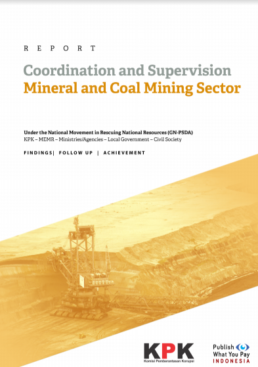Korsup Minerba is one of the program of National Movement on Saving Natural Resources (Gerakan Nasional Penyelelamatan Sumber Daya Alam – GN-PSDA), declared by Chairman of KPK, Commander of the Indonesian National Armed Force, Chief of Police, and Attorney General whom committed to support the governance of natural resources with corruption-free, collusion and nepotism, and also strengthen the law enforcement in natural resources sector.
Took place in 31 provinces throughout Indonesia since 2014, the implementation of Korsup Minerba involves Research and Development team of Deputy of Prevention of KPK together with related Ministries/Institutions such as Directorate General of Mineral and Coal-Ministry of Energy and Mineral Resources, Ministry of Forestry and Environment, Ministry of Finance, local governments, and all other law enforcement agencies as well as civil society such as academics and non-governmental organizations (NGOs). Following are the achievements of Korsup Minerba in five main aspects:
Governing the Mining Business Licenses (Izin Usaha Pertambangan – IUP)
The restructuration of IUP has shown positive results from year to year, with indications of total IUP decrease, especially IUP Non-Clean and Clear (CNC). The number of Non-CNC IUPs in 2017 (per October 2017) is 2,517. This number has declined 48.42% compared to the number of Non-CNC IUPs in 2014 which is the beginning of the action of Korsup Minerba, as much as 4,877.
Financial Liabilities of Business Actor
Korsup Minerba in 2014 has revealed that there are only 70% out of 10 thousand of IUP registered in the Directorate General of Taxes, which amounted to 7,519. Of these numbers, only 84% of them have a Taxpayer Identification Number, and the rest of the number is not identified. While in 2016, Korsup Minerba also identifies the arrears of Non-Tax State Revenues amounting to 25.5 trillion rupiah which the majority of the number contributed by the dispute of Value Added Tax for First Generation of Working Contract on Coal Mining Concession (PKP2B) amounted to 21.8 trillion rupiahs.
The improvement of the state revenues governance in the coal and mineral sector pursued through the Korsup Minerba since 2014, which includes reforming the database, institutional reform by establishing a new directorate specifically handling PNBP of Coal and Mineral sector, and collecting the debt of financial liabilities of business actors as a PNBP, has an impact on the improvement of the PNBP payment system and especially the increment of state revenue from the coal and mineral sector to 30 trillion rupiah.
Supervision of Mining Production
The achievements in this aspect have still inadequately been made. The compliance submission of production reports by the local government to the ministry is still minimal. Differences in production data from various sources are still found. The illegal mining (PETI) is also still rampant. Nevertheless, the improvement of production supervision is being pursued, primarily through the development of coal production monitoring and reporting systems online.
The Obligation of Mine Processing/Refining
Achievements in this aspect have not shown any significant signs. The level of commitment of business entities in building processing/refining facilities is still low. In fact, in 2017 the government (Ministry of Energy and Mineral Resources) issued decrees mandating to reopen export for concentrates and certain raw minerals at certain levels.
Supervision of Trade and Shipping of Mining Products
The weak supervision on the mining trade is highlighted in this aspect, mainly related to the lack of company compliance in reporting their sales, poor compliance of local government in reporting to the central government, as well as differences in export data, in which has impacted on potential state losses of 12,267,781,200 USD or approximately 120 trillion rupiahs as calculated by KPK in 2010.
Disclaimer: This report has limitations in summarizing the process and achievements of the Korsup Minerba in which still ongoing until now. The drafting team sets limits on the collection of data and information compiled in this report as of October 2017.

- Writer: Maryati Abdullah, Rizky Ananda Wulan SR, Meliana Lumbantoruan, Aryanto Nugroho, Asri Nuraeni, Agung Budiono, Lizha Mashita
- Reviewer: Dian Patria, Epa Kartika
- Editor: Maryati Abdullah
- ISBN: 978-602-50032-4-0
- Download: Format PDF – Google Drive